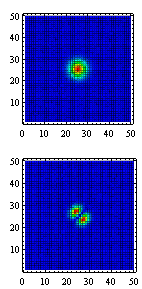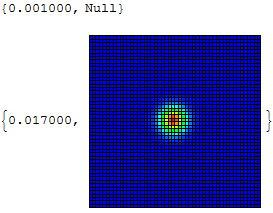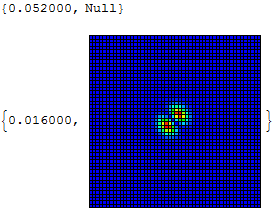There are 4 variables in this multiple sum, and only 2 are used. This question has the similar scenario as the previous one How can I speed up this code with multiple sum?, but the calculation process is different. This code takes about 1 min 38 sec to obtain the results, but I hope the time can be shortened to several seconds. Any help or suggestion will be highly appreciated!
the code is bellow :
data = Table[Exp[-((i + j - 50.)/5)^2] Exp[-((i - j)/5)^2], {i, 50}, {j, 50}];
data = Chop[data, 0.00001];
data = data/Sqrt[Sum[(data[[i, j]])^2, {i, 1, 50}, {j, 1, 50}]];
ListDensityPlot[data, InterpolationOrder -> 0, Mesh -> All, PlotRange -> All, ColorFunction -> (Blend[{Hue[2/3], Hue[0]}, #] &)]
S1[i_, j_, k_, m_, t_] := (data[[i, k]] data[[j, m]])^2 + (data[[j, k]] data[[i,
m]])^2 - 2 data[[i, k]] data[[j, m]] data[[j, k]] data[[i,
m]] Cos[(2 \[Pi]*(3*10^8)/(1584 - 5 + j*0.1 - 0.05) -
2 \[Pi]*(3*10^8)/(1584 - 5 + i*0.1 - 0.05)) t];
S2[i_, j_, t_] := 1/4*\!\(\*UnderoverscriptBox[\(\[Sum]\), \(k = 1\), \(50\)]\(\*UnderoverscriptBox[\(\[Sum]\), \(m = 1\), \(50\)]S1[i, j, k, m,
t]\)\);
data2 = Table[S2[i, j, 4*0.001], {i, 1, 50}, {j, 1, 50}];
ListDensityPlot[data2, InterpolationOrder -> 0, Mesh -> All, PlotRange -> All, ColorFunction -> (Blend[{Hue[2/3], Hue[0]}, #] &)]



